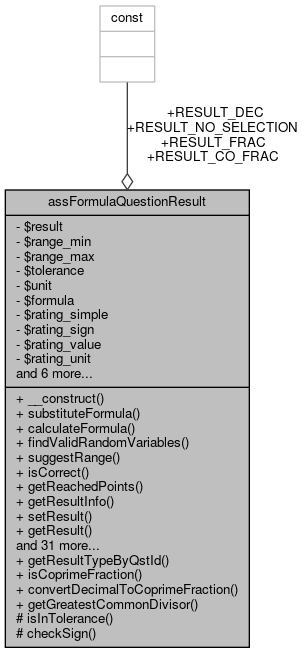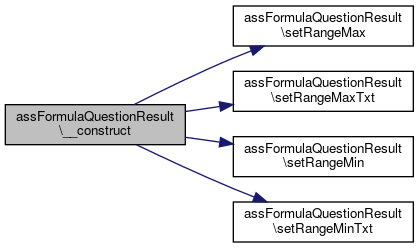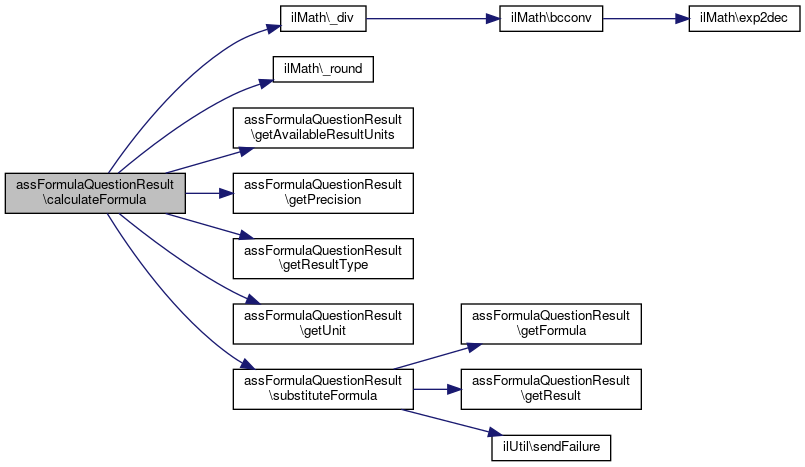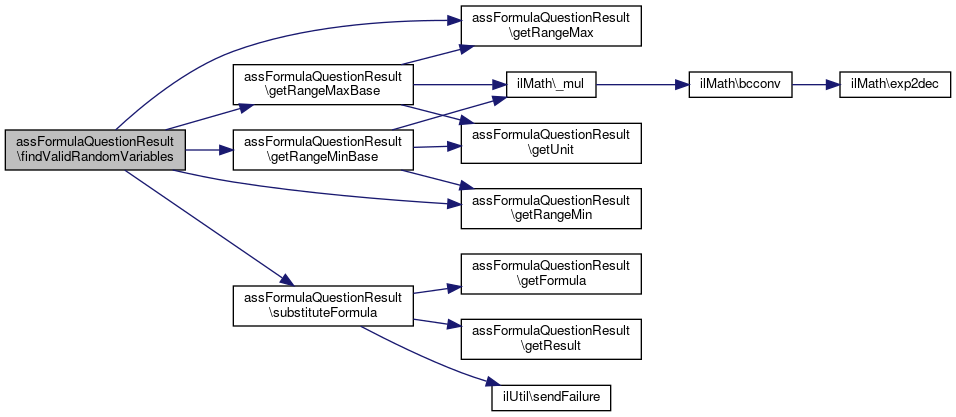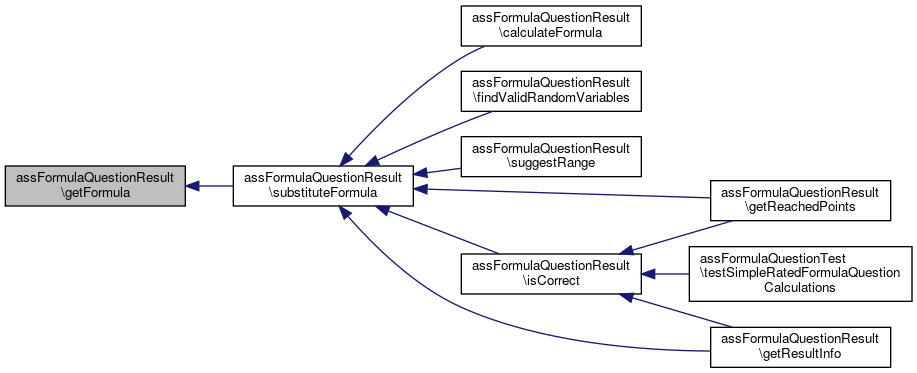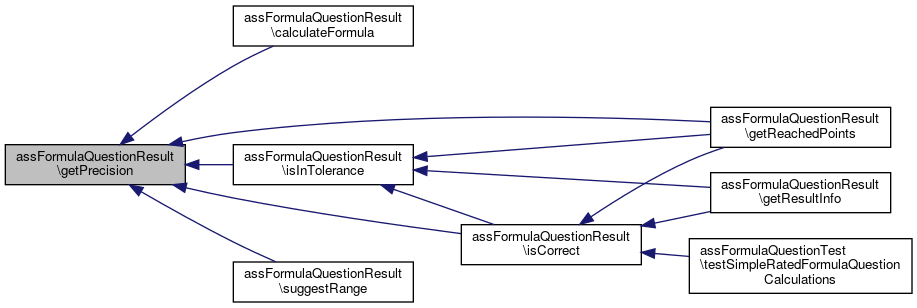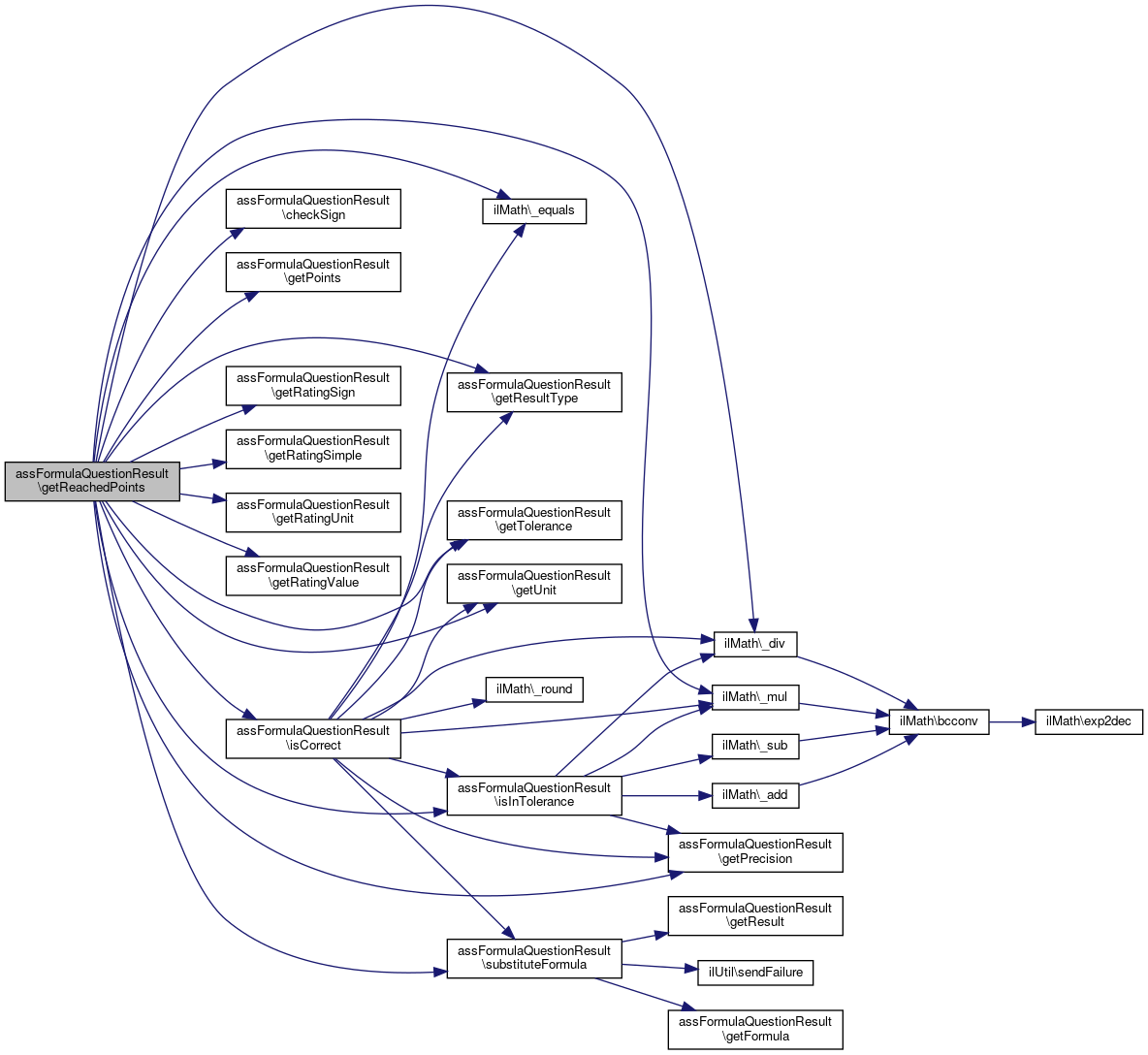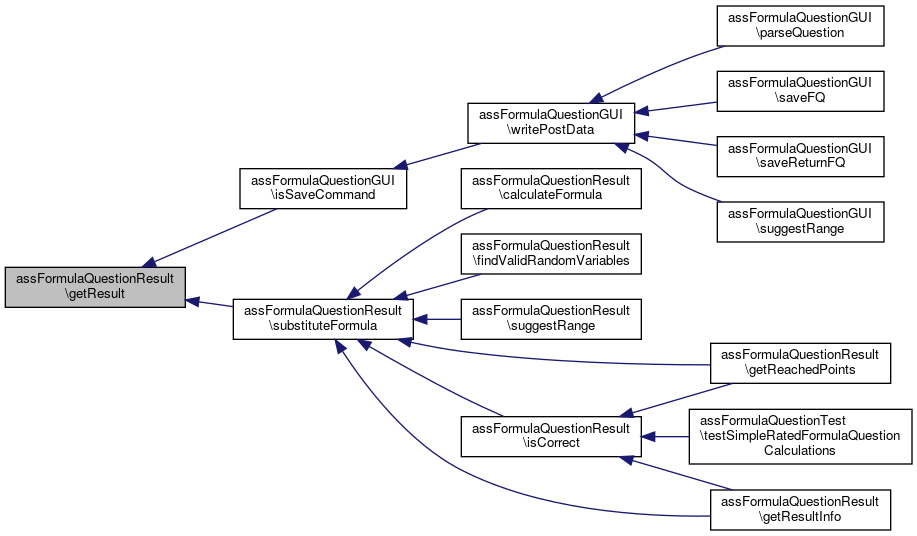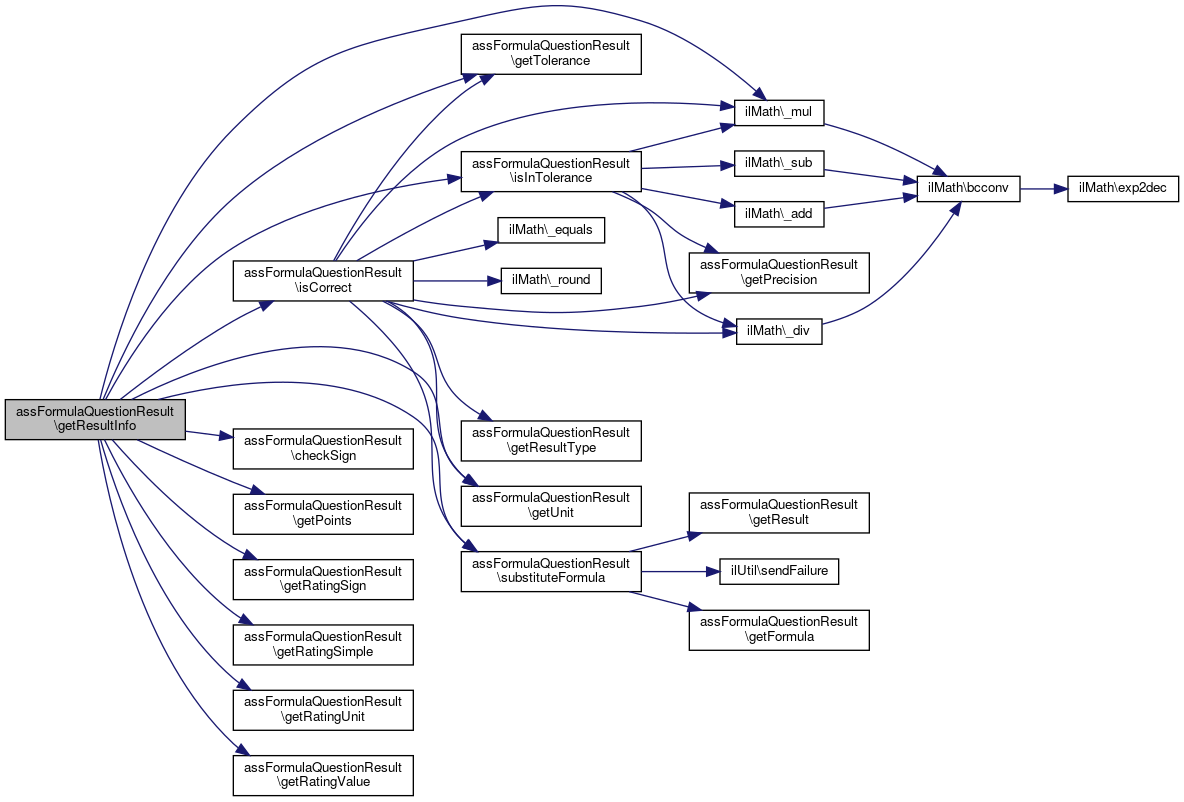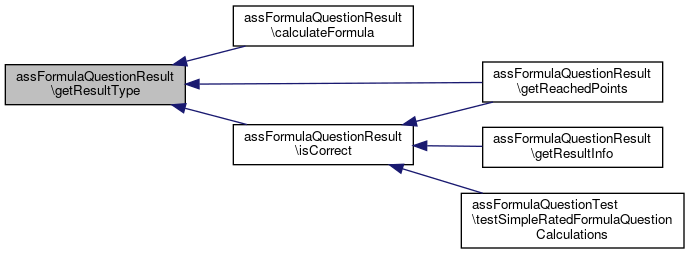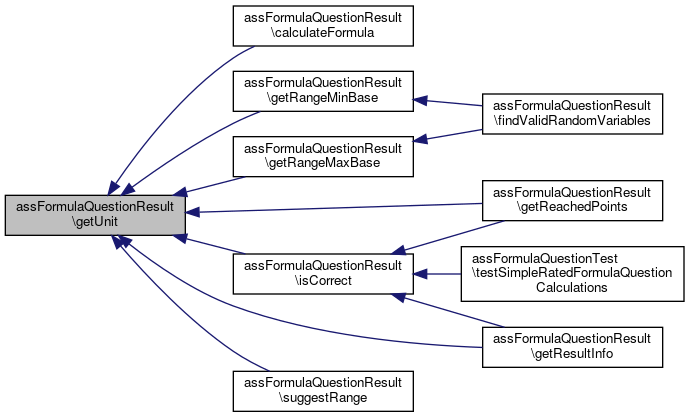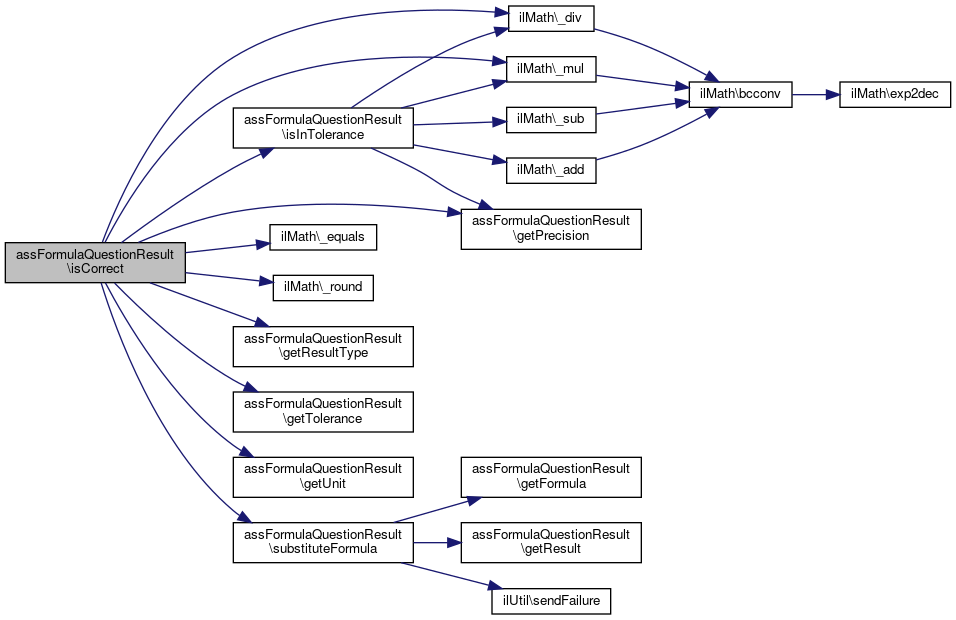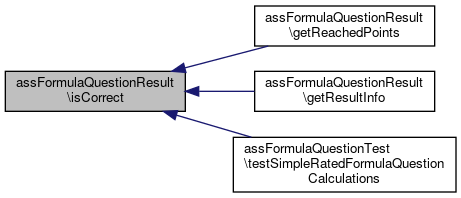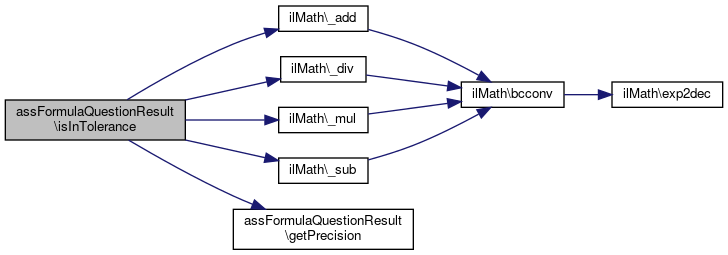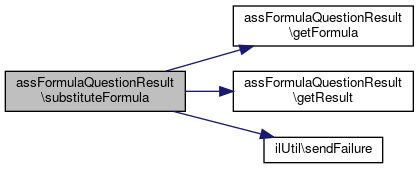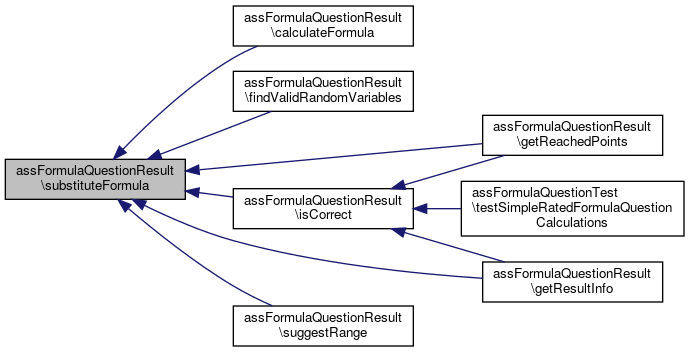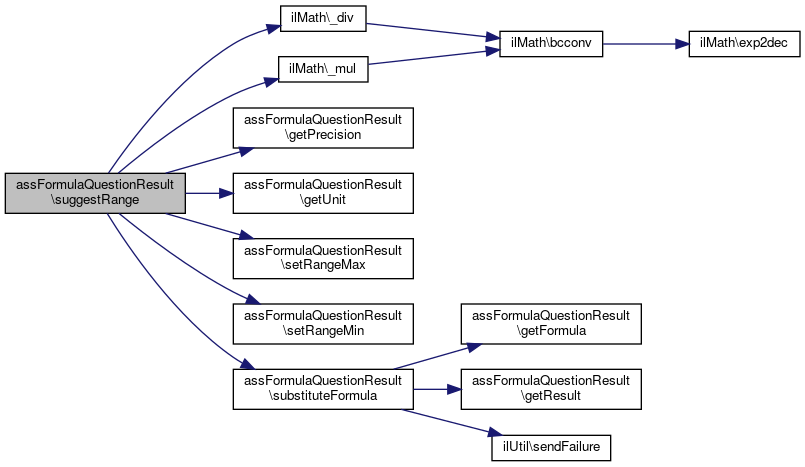Formula Question Result. More...
 Collaboration diagram for assFormulaQuestionResult:
Collaboration diagram for assFormulaQuestionResult:Public Member Functions | |
| __construct ($result, $range_min, $range_max, $tolerance, $unit, $formula, $points, $precision, $rating_simple=TRUE, $rating_sign=33, $rating_value=34, $rating_unit=33, $result_type=0) | |
| assFormulaQuestionResult constructor More... | |
| substituteFormula ($variables, $results) | |
| calculateFormula ($variables, $results, $question_id=0, $use_precision=true) | |
| findValidRandomVariables ($variables, $results) | |
| suggestRange ($variables, $results) | |
| isCorrect ($variables, $results, $value, $unit=NULL) | |
| getReachedPoints ($variables, $results, $value, $unit, $units) | |
| getResultInfo ($variables, $results, $value, $unit, $units) | |
| setResult ($result) | |
| getResult () | |
| setRangeMin ($range_min) | |
| getRangeMin () | |
| getRangeMinBase () | |
| setRangeMax ($range_max) | |
| getRangeMax () | |
| getRangeMaxBase () | |
| setTolerance ($tolerance) | |
| getTolerance () | |
| setUnit ($unit) | |
| getUnit () | |
| setFormula ($formula) | |
| getFormula () | |
| setPoints ($points) | |
| getPoints () | |
| setRatingSimple ($rating_simple) | |
| getRatingSimple () | |
| setRatingSign ($rating_sign) | |
| getRatingSign () | |
| setRatingValue ($rating_value) | |
| getRatingValue () | |
| setRatingUnit ($rating_unit) | |
| getRatingUnit () | |
| setPrecision ($precision) | |
| getPrecision () | |
| setResultType ($a_result_type) | |
| getResultType () | |
| setRangeMaxTxt ($range_max_txt) | |
| getRangeMaxTxt () | |
| setRangeMinTxt ($range_min_txt) | |
| getRangeMinTxt () | |
| getAvailableResultUnits ($question_id) | |
Static Public Member Functions | |
| static | getResultTypeByQstId ($a_qst_id, $a_result) |
| static | isCoprimeFraction ($numerator, $denominator) |
| static | convertDecimalToCoprimeFraction ($decimal_value, $tolerance=1.e-9) |
| static | getGreatestCommonDivisor ($a, $b) |
Data Fields | |
| const | RESULT_NO_SELECTION = 0 |
| const | RESULT_DEC = 1 |
| const | RESULT_FRAC = 2 |
| const | RESULT_CO_FRAC = 3 |
Protected Member Functions | |
| isInTolerance ($v1, $v2, $p) | |
| checkSign ($v1, $v2) | |
Private Attributes | |
| $result | |
| $range_min | |
| $range_max | |
| $tolerance | |
| $unit | |
| $formula | |
| $rating_simple | |
| $rating_sign | |
| $rating_value | |
| $rating_unit | |
| $points | |
| $precision | |
| $result_type | |
| $range_min_txt | |
| $range_max_txt | |
| $available_units = array() | |
Detailed Description
Formula Question Result.
- Version
- Id
- class.assFormulaQuestionResult.php 944 2009-11-09 16:11:30Z hschottm
Definition at line 10 of file class.assFormulaQuestionResult.php.
Constructor & Destructor Documentation
◆ __construct()
| assFormulaQuestionResult::__construct | ( | $result, | |
| $range_min, | |||
| $range_max, | |||
| $tolerance, | |||
| $unit, | |||
| $formula, | |||
| $points, | |||
| $precision, | |||
$rating_simple = TRUE, |
|||
$rating_sign = 33, |
|||
$rating_value = 34, |
|||
$rating_unit = 33, |
|||
$result_type = 0 |
|||
| ) |
assFormulaQuestionResult constructor
- Parameters
-
string $result Result name double $range_min Range minimum double $range_max Range maximum double $tolerance Tolerance of the result in percent object $unit Unit string $formula The formula to calculate the result double $points The maximum available points for the result integer $precision Number of decimal places of the value boolean $rating_simple Use simple rating (100% if right, 0 % if wrong) double $rating_sign Percentage of rating for the correct sign double $rating_value Percentage of rating for the correct value double $rating_unit Percentage of rating for the correct unit @access public
Definition at line 51 of file class.assFormulaQuestionResult.php.
References $formula, $points, $precision, $range_max, $range_min, $rating_sign, $rating_simple, $rating_unit, $rating_value, $result, $result_type, $tolerance, $unit, setRangeMax(), setRangeMaxTxt(), setRangeMin(), and setRangeMinTxt().
 Here is the call graph for this function:
Here is the call graph for this function:Member Function Documentation
◆ calculateFormula()
| assFormulaQuestionResult::calculateFormula | ( | $variables, | |
| $results, | |||
$question_id = 0, |
|||
$use_precision = true |
|||
| ) |
Definition at line 105 of file class.assFormulaQuestionResult.php.
References $formula, $res, $result, $results, ilMath\_div(), ilMath\_round(), getAvailableResultUnits(), getPrecision(), getResultType(), getUnit(), and substituteFormula().
 Here is the call graph for this function:
Here is the call graph for this function:◆ checkSign()
|
protected |
Definition at line 478 of file class.assFormulaQuestionResult.php.
Referenced by getReachedPoints(), and getResultInfo().
 Here is the caller graph for this function:
Here is the caller graph for this function:◆ convertDecimalToCoprimeFraction()
|
static |
Definition at line 949 of file class.assFormulaQuestionResult.php.
References $result, and $tolerance.
Referenced by assFormulaQuestion\getBestSolution(), and assFormulaQuestion\substituteVariables().
 Here is the caller graph for this function:
Here is the caller graph for this function:◆ findValidRandomVariables()
| assFormulaQuestionResult::findValidRandomVariables | ( | $variables, | |
| $results | |||
| ) |
Definition at line 156 of file class.assFormulaQuestionResult.php.
References $formula, $result, $results, getRangeMax(), getRangeMaxBase(), getRangeMin(), getRangeMinBase(), and substituteFormula().
 Here is the call graph for this function:
Here is the call graph for this function:◆ getAvailableResultUnits()
| assFormulaQuestionResult::getAvailableResultUnits | ( | $question_id | ) |
Definition at line 1011 of file class.assFormulaQuestionResult.php.
References $available_units, $ilDB, $res, and $row.
Referenced by calculateFormula().
 Here is the caller graph for this function:
Here is the caller graph for this function:◆ getFormula()
| assFormulaQuestionResult::getFormula | ( | ) |
Definition at line 829 of file class.assFormulaQuestionResult.php.
References $formula.
Referenced by substituteFormula().
 Here is the caller graph for this function:
Here is the caller graph for this function:◆ getGreatestCommonDivisor()
|
static |
Definition at line 998 of file class.assFormulaQuestionResult.php.
References getGreatestCommonDivisor().
Referenced by getGreatestCommonDivisor(), and isCoprimeFraction().
 Here is the call graph for this function:
Here is the call graph for this function: Here is the caller graph for this function:
Here is the caller graph for this function:◆ getPoints()
| assFormulaQuestionResult::getPoints | ( | ) |
Definition at line 839 of file class.assFormulaQuestionResult.php.
References $points.
Referenced by getReachedPoints(), and getResultInfo().
 Here is the caller graph for this function:
Here is the caller graph for this function:◆ getPrecision()
| assFormulaQuestionResult::getPrecision | ( | ) |
Definition at line 889 of file class.assFormulaQuestionResult.php.
References $precision.
Referenced by calculateFormula(), getReachedPoints(), isCorrect(), isInTolerance(), and suggestRange().
 Here is the caller graph for this function:
Here is the caller graph for this function:◆ getRangeMax()
| assFormulaQuestionResult::getRangeMax | ( | ) |
Definition at line 786 of file class.assFormulaQuestionResult.php.
References $range_max.
Referenced by findValidRandomVariables(), and getRangeMaxBase().
 Here is the caller graph for this function:
Here is the caller graph for this function:◆ getRangeMaxBase()
| assFormulaQuestionResult::getRangeMaxBase | ( | ) |
Definition at line 791 of file class.assFormulaQuestionResult.php.
References ilMath\_mul(), getRangeMax(), and getUnit().
Referenced by findValidRandomVariables().
 Here is the call graph for this function:
Here is the call graph for this function: Here is the caller graph for this function:
Here is the caller graph for this function:◆ getRangeMaxTxt()
| assFormulaQuestionResult::getRangeMaxTxt | ( | ) |
Definition at line 909 of file class.assFormulaQuestionResult.php.
References $range_max_txt.
◆ getRangeMin()
| assFormulaQuestionResult::getRangeMin | ( | ) |
Definition at line 751 of file class.assFormulaQuestionResult.php.
References $range_min.
Referenced by findValidRandomVariables(), and getRangeMinBase().
 Here is the caller graph for this function:
Here is the caller graph for this function:◆ getRangeMinBase()
| assFormulaQuestionResult::getRangeMinBase | ( | ) |
Definition at line 756 of file class.assFormulaQuestionResult.php.
References ilMath\_mul(), getRangeMin(), and getUnit().
Referenced by findValidRandomVariables().
 Here is the call graph for this function:
Here is the call graph for this function: Here is the caller graph for this function:
Here is the caller graph for this function:◆ getRangeMinTxt()
| assFormulaQuestionResult::getRangeMinTxt | ( | ) |
Definition at line 919 of file class.assFormulaQuestionResult.php.
References $range_min_txt.
◆ getRatingSign()
| assFormulaQuestionResult::getRatingSign | ( | ) |
Definition at line 859 of file class.assFormulaQuestionResult.php.
References $rating_sign.
Referenced by getReachedPoints(), and getResultInfo().
 Here is the caller graph for this function:
Here is the caller graph for this function:◆ getRatingSimple()
| assFormulaQuestionResult::getRatingSimple | ( | ) |
Definition at line 849 of file class.assFormulaQuestionResult.php.
References $rating_simple.
Referenced by getReachedPoints(), and getResultInfo().
 Here is the caller graph for this function:
Here is the caller graph for this function:◆ getRatingUnit()
| assFormulaQuestionResult::getRatingUnit | ( | ) |
Definition at line 879 of file class.assFormulaQuestionResult.php.
References $rating_unit.
Referenced by getReachedPoints(), and getResultInfo().
 Here is the caller graph for this function:
Here is the caller graph for this function:◆ getRatingValue()
| assFormulaQuestionResult::getRatingValue | ( | ) |
Definition at line 869 of file class.assFormulaQuestionResult.php.
References $rating_value.
Referenced by getReachedPoints(), and getResultInfo().
 Here is the caller graph for this function:
Here is the caller graph for this function:◆ getReachedPoints()
| assFormulaQuestionResult::getReachedPoints | ( | $variables, | |
| $results, | |||
| $value, | |||
| $unit, | |||
| $units | |||
| ) |
Definition at line 490 of file class.assFormulaQuestionResult.php.
References $formula, $ilLog, $points, $result, $results, $unit, ilMath\_div(), ilMath\_equals(), ilMath\_mul(), checkSign(), getPoints(), getPrecision(), getRatingSign(), getRatingSimple(), getRatingUnit(), getRatingValue(), getResultType(), getTolerance(), getUnit(), isCorrect(), isInTolerance(), RESULT_CO_FRAC, RESULT_DEC, RESULT_FRAC, RESULT_NO_SELECTION, and substituteFormula().
 Here is the call graph for this function:
Here is the call graph for this function:◆ getResult()
| assFormulaQuestionResult::getResult | ( | ) |
Definition at line 728 of file class.assFormulaQuestionResult.php.
References $result.
Referenced by substituteFormula().
 Here is the caller graph for this function:
Here is the caller graph for this function:◆ getResultInfo()
| assFormulaQuestionResult::getResultInfo | ( | $variables, | |
| $results, | |||
| $value, | |||
| $unit, | |||
| $units | |||
| ) |
Definition at line 648 of file class.assFormulaQuestionResult.php.
References $formula, $points, $result, $results, $unit, ilMath\_mul(), checkSign(), getPoints(), getRatingSign(), getRatingSimple(), getRatingUnit(), getRatingValue(), getTolerance(), getUnit(), isCorrect(), isInTolerance(), and substituteFormula().
 Here is the call graph for this function:
Here is the call graph for this function:◆ getResultType()
| assFormulaQuestionResult::getResultType | ( | ) |
Definition at line 899 of file class.assFormulaQuestionResult.php.
References $result_type.
Referenced by calculateFormula(), getReachedPoints(), and isCorrect().
 Here is the caller graph for this function:
Here is the caller graph for this function:◆ getResultTypeByQstId()
|
static |
Definition at line 924 of file class.assFormulaQuestionResult.php.
References $ilDB, $res, and $row.
Referenced by assFormulaQuestionGUI\getPreview(), and assFormulaQuestionGUI\getTestOutput().
 Here is the caller graph for this function:
Here is the caller graph for this function:◆ getTolerance()
| assFormulaQuestionResult::getTolerance | ( | ) |
Definition at line 809 of file class.assFormulaQuestionResult.php.
References $tolerance.
Referenced by getReachedPoints(), getResultInfo(), and isCorrect().
 Here is the caller graph for this function:
Here is the caller graph for this function:◆ getUnit()
| assFormulaQuestionResult::getUnit | ( | ) |
Definition at line 819 of file class.assFormulaQuestionResult.php.
References $unit.
Referenced by calculateFormula(), getRangeMaxBase(), getRangeMinBase(), getReachedPoints(), getResultInfo(), isCorrect(), and suggestRange().
 Here is the caller graph for this function:
Here is the caller graph for this function:◆ isCoprimeFraction()
|
static |
Definition at line 942 of file class.assFormulaQuestionResult.php.
References getGreatestCommonDivisor().
 Here is the call graph for this function:
Here is the call graph for this function:◆ isCorrect()
| assFormulaQuestionResult::isCorrect | ( | $variables, | |
| $results, | |||
| $value, | |||
$unit = NULL |
|||
| ) |
- Parameters
-
$variables formula variables containing units $results formula results containing units $value user input value null $unit user input unit
- Returns
- bool
Definition at line 248 of file class.assFormulaQuestionResult.php.
References $formula, $result, $results, $unit, ilMath\_div(), ilMath\_equals(), ilMath\_mul(), ilMath\_round(), getPrecision(), getResultType(), getTolerance(), getUnit(), isInTolerance(), RESULT_CO_FRAC, RESULT_DEC, RESULT_FRAC, RESULT_NO_SELECTION, and substituteFormula().
Referenced by getReachedPoints(), and getResultInfo().
 Here is the call graph for this function:
Here is the call graph for this function: Here is the caller graph for this function:
Here is the caller graph for this function:◆ isInTolerance()
|
protected |
Definition at line 468 of file class.assFormulaQuestionResult.php.
References ilMath\_add(), ilMath\_div(), ilMath\_mul(), ilMath\_sub(), and getPrecision().
Referenced by getReachedPoints(), getResultInfo(), and isCorrect().
 Here is the call graph for this function:
Here is the call graph for this function: Here is the caller graph for this function:
Here is the caller graph for this function:◆ setFormula()
| assFormulaQuestionResult::setFormula | ( | $formula | ) |
Definition at line 824 of file class.assFormulaQuestionResult.php.
References $formula.
◆ setPoints()
| assFormulaQuestionResult::setPoints | ( | $points | ) |
Definition at line 834 of file class.assFormulaQuestionResult.php.
References $points.
◆ setPrecision()
| assFormulaQuestionResult::setPrecision | ( | $precision | ) |
Definition at line 884 of file class.assFormulaQuestionResult.php.
References $precision.
◆ setRangeMax()
| assFormulaQuestionResult::setRangeMax | ( | $range_max | ) |
Definition at line 769 of file class.assFormulaQuestionResult.php.
References $range_max, and $result.
Referenced by __construct(), and suggestRange().
 Here is the caller graph for this function:
Here is the caller graph for this function:◆ setRangeMaxTxt()
| assFormulaQuestionResult::setRangeMaxTxt | ( | $range_max_txt | ) |
Definition at line 904 of file class.assFormulaQuestionResult.php.
References $range_max_txt.
Referenced by __construct().
 Here is the caller graph for this function:
Here is the caller graph for this function:◆ setRangeMin()
| assFormulaQuestionResult::setRangeMin | ( | $range_min | ) |
Definition at line 733 of file class.assFormulaQuestionResult.php.
References $range_min, and $result.
Referenced by __construct(), and suggestRange().
 Here is the caller graph for this function:
Here is the caller graph for this function:◆ setRangeMinTxt()
| assFormulaQuestionResult::setRangeMinTxt | ( | $range_min_txt | ) |
Definition at line 914 of file class.assFormulaQuestionResult.php.
References $range_min_txt.
Referenced by __construct().
 Here is the caller graph for this function:
Here is the caller graph for this function:◆ setRatingSign()
| assFormulaQuestionResult::setRatingSign | ( | $rating_sign | ) |
Definition at line 854 of file class.assFormulaQuestionResult.php.
References $rating_sign.
◆ setRatingSimple()
| assFormulaQuestionResult::setRatingSimple | ( | $rating_simple | ) |
Definition at line 844 of file class.assFormulaQuestionResult.php.
References $rating_simple.
◆ setRatingUnit()
| assFormulaQuestionResult::setRatingUnit | ( | $rating_unit | ) |
Definition at line 874 of file class.assFormulaQuestionResult.php.
References $rating_unit.
◆ setRatingValue()
| assFormulaQuestionResult::setRatingValue | ( | $rating_value | ) |
Definition at line 864 of file class.assFormulaQuestionResult.php.
References $rating_value.
◆ setResult()
| assFormulaQuestionResult::setResult | ( | $result | ) |
Definition at line 723 of file class.assFormulaQuestionResult.php.
References $result.
◆ setResultType()
| assFormulaQuestionResult::setResultType | ( | $a_result_type | ) |
Definition at line 894 of file class.assFormulaQuestionResult.php.
◆ setTolerance()
| assFormulaQuestionResult::setTolerance | ( | $tolerance | ) |
Definition at line 804 of file class.assFormulaQuestionResult.php.
References $tolerance.
◆ setUnit()
| assFormulaQuestionResult::setUnit | ( | $unit | ) |
Definition at line 814 of file class.assFormulaQuestionResult.php.
References $unit.
◆ substituteFormula()
| assFormulaQuestionResult::substituteFormula | ( | $variables, | |
| $results | |||
| ) |
Definition at line 74 of file class.assFormulaQuestionResult.php.
References $formula, $lng, $result, $results, getFormula(), getResult(), ilUtil\sendFailure(), and substituteFormula().
Referenced by calculateFormula(), findValidRandomVariables(), getReachedPoints(), getResultInfo(), isCorrect(), substituteFormula(), and suggestRange().
 Here is the call graph for this function:
Here is the call graph for this function: Here is the caller graph for this function:
Here is the caller graph for this function:◆ suggestRange()
| assFormulaQuestionResult::suggestRange | ( | $variables, | |
| $results | |||
| ) |
Definition at line 202 of file class.assFormulaQuestionResult.php.
References $formula, $range_max, $range_min, $result, $results, ilMath\_div(), ilMath\_mul(), getPrecision(), getUnit(), setRangeMax(), setRangeMin(), and substituteFormula().
 Here is the call graph for this function:
Here is the call graph for this function:Field Documentation
◆ $available_units
|
private |
Definition at line 33 of file class.assFormulaQuestionResult.php.
Referenced by getAvailableResultUnits().
◆ $formula
|
private |
Definition at line 22 of file class.assFormulaQuestionResult.php.
Referenced by __construct(), calculateFormula(), findValidRandomVariables(), getFormula(), getReachedPoints(), getResultInfo(), isCorrect(), setFormula(), substituteFormula(), and suggestRange().
◆ $points
|
private |
Definition at line 27 of file class.assFormulaQuestionResult.php.
Referenced by __construct(), getPoints(), getReachedPoints(), getResultInfo(), and setPoints().
◆ $precision
|
private |
Definition at line 28 of file class.assFormulaQuestionResult.php.
Referenced by __construct(), getPrecision(), and setPrecision().
◆ $range_max
|
private |
Definition at line 19 of file class.assFormulaQuestionResult.php.
Referenced by __construct(), getRangeMax(), setRangeMax(), and suggestRange().
◆ $range_max_txt
|
private |
Definition at line 31 of file class.assFormulaQuestionResult.php.
Referenced by getRangeMaxTxt(), and setRangeMaxTxt().
◆ $range_min
|
private |
Definition at line 18 of file class.assFormulaQuestionResult.php.
Referenced by __construct(), getRangeMin(), setRangeMin(), and suggestRange().
◆ $range_min_txt
|
private |
Definition at line 30 of file class.assFormulaQuestionResult.php.
Referenced by getRangeMinTxt(), and setRangeMinTxt().
◆ $rating_sign
|
private |
Definition at line 24 of file class.assFormulaQuestionResult.php.
Referenced by __construct(), getRatingSign(), and setRatingSign().
◆ $rating_simple
|
private |
Definition at line 23 of file class.assFormulaQuestionResult.php.
Referenced by __construct(), getRatingSimple(), and setRatingSimple().
◆ $rating_unit
|
private |
Definition at line 26 of file class.assFormulaQuestionResult.php.
Referenced by __construct(), getRatingUnit(), and setRatingUnit().
◆ $rating_value
|
private |
Definition at line 25 of file class.assFormulaQuestionResult.php.
Referenced by __construct(), getRatingValue(), and setRatingValue().
◆ $result
|
private |
Definition at line 17 of file class.assFormulaQuestionResult.php.
Referenced by __construct(), calculateFormula(), convertDecimalToCoprimeFraction(), findValidRandomVariables(), getReachedPoints(), getResult(), getResultInfo(), isCorrect(), setRangeMax(), setRangeMin(), setResult(), substituteFormula(), and suggestRange().
◆ $result_type
|
private |
Definition at line 29 of file class.assFormulaQuestionResult.php.
Referenced by __construct(), and getResultType().
◆ $tolerance
|
private |
Definition at line 20 of file class.assFormulaQuestionResult.php.
Referenced by __construct(), convertDecimalToCoprimeFraction(), getTolerance(), and setTolerance().
◆ $unit
|
private |
Definition at line 21 of file class.assFormulaQuestionResult.php.
Referenced by __construct(), getReachedPoints(), getResultInfo(), getUnit(), isCorrect(), and setUnit().
◆ RESULT_CO_FRAC
| const assFormulaQuestionResult::RESULT_CO_FRAC = 3 |
Definition at line 15 of file class.assFormulaQuestionResult.php.
Referenced by assFormulaQuestion\getBestSolution(), getReachedPoints(), isCorrect(), assFormulaQuestionTest\simpleRatedCalculationsData(), and assFormulaQuestion\substituteVariables().
◆ RESULT_DEC
| const assFormulaQuestionResult::RESULT_DEC = 1 |
Definition at line 13 of file class.assFormulaQuestionResult.php.
Referenced by getReachedPoints(), isCorrect(), assFormulaQuestionTest\simpleRatedCalculationsData(), and assFormulaQuestion\substituteVariables().
◆ RESULT_FRAC
| const assFormulaQuestionResult::RESULT_FRAC = 2 |
Definition at line 14 of file class.assFormulaQuestionResult.php.
Referenced by assFormulaQuestion\getBestSolution(), getReachedPoints(), isCorrect(), assFormulaQuestionTest\simpleRatedCalculationsData(), and assFormulaQuestion\substituteVariables().
◆ RESULT_NO_SELECTION
| const assFormulaQuestionResult::RESULT_NO_SELECTION = 0 |
Definition at line 12 of file class.assFormulaQuestionResult.php.
Referenced by getReachedPoints(), isCorrect(), assFormulaQuestionTest\simpleRatedCalculationsData(), and assFormulaQuestion\substituteVariables().
The documentation for this class was generated from the following file:
- Modules/TestQuestionPool/classes/class.assFormulaQuestionResult.php
